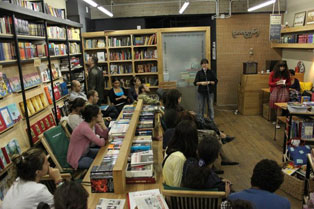Salome Achba
On September 23, youth club of the Human Rights House Tbilisi organized screening of Salome Jashi’s documentary film “Speechless” in the book-shop Diogenes. After the screening, head of Union “Sapari,” psychologist Nata Zazashvili led discussion about the film. The participants of the discussion mostly spoke about traumas and conflict, as well as psychological aspects of the military operations.
Short, experimental film of a young director Salome Jashi “Speechless” demonstrates tragedy of citizens victimized during the Russian-Georgian armed conflict. The film does not contain author’s text or music. The characters do not speak either. At the end, the real stories of the characters are described in several sentences in subtitles. In the film, a spectator sees faces of people, who personally witnessed the horror of the war. They tell horror stories about military operations but in different way – in silence. The faces, gestures, mimics, tears in eyes vividly show what really happened during the war. The stories told in silence more clearly speak about the tragedy than verbally told stories.
After the screening, the audience could not hide their emotions. “The film demonstrates completely different vision of the author and it is the most appreciable in it. Every film about the war shows military operations, blood, wounded or killed people. Here, the author presented the horror of the war in completely different point,” said Nino Marshania, one of the discussion participants.
Psychologist Nata Zazashvili said one of the problems of the Georgian society is lack of tolerance and solidarity. She said the Georgian society, particularly residents of the capital, were more tolerant about the victims of the recent war than those form Abkhazian war in the 1990s. She said it might have happened because that time society had more economical and social problems of in the 1990s than in 2008.
“Then, the entire nation was in agony and maybe it resulted into less tolerance and solidarity with the IDPs. During the August war, part of the society, who was not direct target of the military operations, expressed more solidarity and tolerance to the new wave of IDPs than in the 1990s. However, it should be noted that unfortunately this tolerance lasted only several days… Generally, our society is not that much tolerant,” said Nata Zazashvili.
The Human Rights House Tbilisi organized the screening of the “Speechless” in the framework of the Peace Week. The Peace Week was dedicated to the International Day of Peace – September 21. The day was established in 1981 by the UN General Assembly and since then it is celebrated throughout the world yearly. With the establishment of the day the UN promotes peace in the world and calls upon the humankind to unify for this goal.
HRHT coordinator Nino Gvedashvili said similar events will raise awareness about the Peace Day in the society and will promote peacebuilding in general.
“HRHT and its member organizations joined the UN appeal and dedicated the Peace Week to the day. The purpose of the Weak was to raise awareness about the day among students and the society in general and to promote increase of civil activity in the peacebuilding process. More than one hundred students, journalists and civil society representatives involved and participated in the events scheduled in the framework of the Peace Weak. I think, the HRHT did its bit to the peacebuilding process with this Week. Our youth club will continue its activities in this direction as it was students’ wish,” said Nino Gvedashvili.




